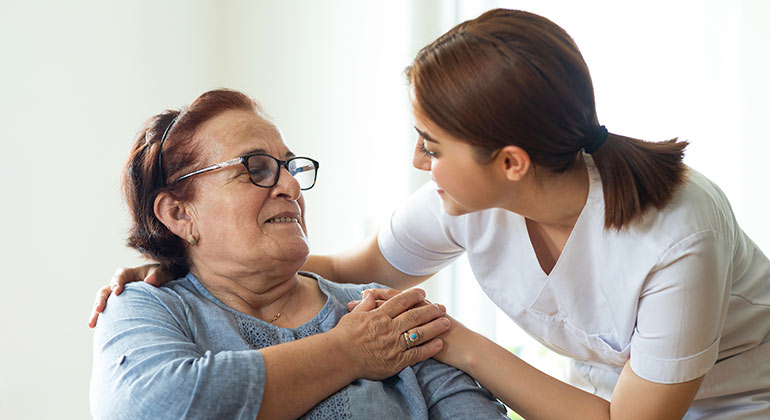How the Program Works

The Comprehensive Care for Older Adults With HIV is a team-based approach to the assessment and care planning for older adults living with HIV developed by Mount Sinai Health System’s Brookdale Department of Geriatrics and Palliative Medicine and the Institute for Advanced Medicine. Each team member has a specific role and everyone works together to provide the best possible care. Patients meet one-on-one with each of the core team members: a community health worker (CHW), a pharmacist, a geriatrician, a social worker, and a nurse.
This guidance focuses on the CHW’s special role in helping patients navigate their health care. The geriatrics team dedicates one day a week to seeing older adults with HIV. Each patient visit is scheduled for 30 or 60 minutes (30 minutes for follow-up visits, and 60 minutes for new patient appointments). Patients come to the program either on their own or are referred by a health care provider. Typically, patients speak with the CHW before, during, and after each visit. The new patient visit has several parts, as follows.
Before the Visit
In advance of the visit, the CHW will:
- Help with services such as transportation assistance to appointments, which supports patient engagement and decreases missed appointments
- Complete Activities of Daily Living and Instrumental Activities of Daily Living screens
The CHW will call the patient twice before the scheduled visit. The first time will be five to six days before the visit. The CHW will call again the day before the visit.
During the First Patient Visit
The geriatrics team should conduct the geriatric patient visit as usual, with the addition of the CHW. The visit begins when the nurse and CHW greet the patient in the waiting room and explain the process of the visit. The nurse and CHW will lead the patient to the nurse triage station.
The nurse will check the patient’s vitals, review the patient’s medical history, and screen for falls. The nurse will also check on the health care proxy.
Check to see if there is a copy of the health care proxy in the electronic medical record. If not, ask them to fill out a form in the office or bring copy from home to the next visit with their doctor or with the geriatrics team.
Next, the CHW will perform the depression screening (PHQ-4), FRAIL screen, and any additional screenings indicated.
Meeting the Pharmacist
After these screenings, the CHW will bring the patient to the pharmacist. If the CHW has time, they will remain with the patient during this conversation. The pharmacist will review all medications that the patient is taking. The pharmacist will go over the indications, side effects, any medication allergies, and pill management (weekly pill box or individual bottles) for each. Then the pharmacist will look at all lab test results, including renal function (creatinine clearance/eGFR), liver function, and CD4 lymphocyte count/viral load. The pharmacist will follow the standards of care as usual, as highlighted below.
The pharmacist will complete:
Medical review:
- Medication reconciliation
- Assess polypharmacy
- Total number of medications
- Chronic medications
- PRN medications (drugs taken as needed)
- Total number of medications on Beers Criteria
- Total number of medications with risk of QTc prolongation
- Anticholinergic burden score
- Drug-drug interactions
- Medication recommendations
Document in the electronic medical record and route to doctor:
- Assessment
- Management
- Recommendations
Meeting the Doctor
After the pharmacist interview, the patient will meet with a doctor who specializes in older patients, called a geriatrician. The CHW will bring the patient to the doctor’s office and remain until the doctor arrives. At that point, the CHW will leave so the patient can feel comfortable sharing private information. The doctor will conduct the geriatric screens. Patients can discuss what matters most to them. The key aspects of the assessment are below. Click here for further details:
- Screenings
- Veterans Aging Cohort Study Index (assesses frailty)
- FRAIL Scale questions four to five (the CHW asked questions one to three during the visit)
- Review systems including appetite, sleep, hearing, vision, cognition, and constipation.
- Finalize and review results of comprehensive geriatric assessment, including screening results completed by the CHW and nurse.
- Develop care plan.
- Adjust medications based on pharmacist recommendations.
- Make referrals to address geriatric vulnerabilities (e.g., imaging studies or specialty appointments). The doctor will tell the CHW, who will facilitate coordination.
- Document all assessment, management, and recommendations in the electronic medical record.
Meeting the Social Worker
If the screenings indicate that the patient needs to meet with the social worker, the CHW will coordinate. This may involve making an appointment for another day. The CHW will arrange the appointment, accompany the patient to the social worker’s office, and stay until the social worker arrives.
Patient Check-Out
When the patient is ready to leave, they will make a follow-up appointment at the front desk. If the CHW is available, they can escort the patient and assist in scheduling post-visit services.
Based on the patient’s care plan, the CHW will provide follow-up phone calls and care coordination. This involves a post-visit phone call one to two weeks after the visit. During this phone call, the CHW will:
- Review the patient chart to ensure that any needed appointments have been scheduled.
- Offer assistance if appointments haven’t been scheduled.
- Work with the social worker to help coordinate any transportation assistance.
- Connect the patient to community-based services that were identified.
- Document these activities in the electronic medical record.
- Discuss the case during supervision conferences with the geriatrician and social worker.
- The CHW will meet weekly with the:
- Geriatrician—to review the care plan
- Social worker—to discuss any social/community needs
- The CHW will meet weekly with the: